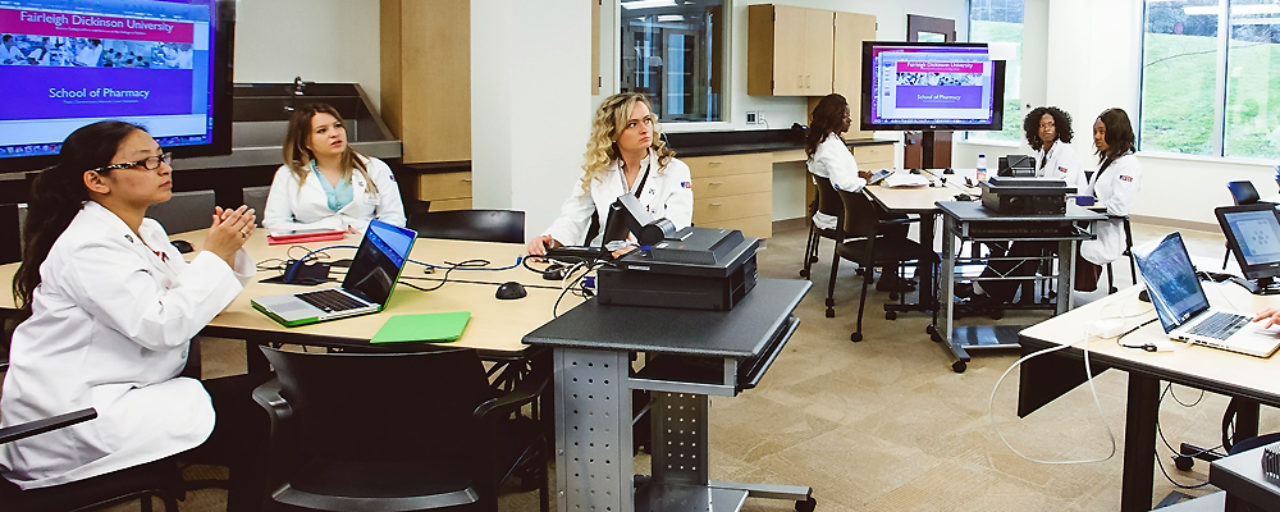Pharmacy Program Outcomes and Accreditation

Accreditation
Fairleigh Dickinson University School of Pharmacy and Health Sciences’ Doctor of Pharmacy program is accredited by the Accreditation Council for Pharmacy Education.
- 135 South LaSalle Street, Suite 4100, Chicago, IL 60503
- 312-664-3575, Fax 312-664-4652
Licensure
As a fully accredited program by the Accreditation Council for Pharmacy Education (ACPE), FDU’s PharmD program meets the academic requirements for licensure in all 50 states. Separate from educational requirements, state licensure boards may require applicants to complete other requirements. Please see state-specific licensure guidelines.
Professional licensure and certification requirements may vary state to state, and are also subject to change. Students should contact the appropriate licensing agency in each home state to obtain the most up-to-date information.
Mission and vision
The mission of FDU’s School of Pharmacy and Health Sciences is to create a values-based, student-centered learning experience that prepares graduates who are committed to improving the health of individuals and populations through leadership roles in pharmacy practice, health care research, and related health care fields.
Our Pharmacy Program vision is to prepare future pharmacists for diverse roles across the health care continuum through a culture of learning, scholarship, innovation, advocacy, and leadership.
Core Tenets
- THINK critically, analyze data, detect and solve problems on a path through lifelong learning.
- COMMUNICATE knowledge, skills and the confidence to practice pharmacy as an ethical professional and leader.
- ADVOCATE and participate as a team member on an interdisciplinary team that may consist of physicians, nurses, pharmacists, ethicists, other health professionals, and patients.
- LEAD for individual patients and patient populations through the practice of pharmacy.
- IMPLEMENT safe and effective medication therapy management that individualizes patient care and ensures adherence, and supports the ideas of prevention and wellness.
Outcomes
Foundational Knowledge
Graduates will possess the knowledge, skills, abilities, behaviors, and attitudes necessary to apply the foundational sciences to the provision of patient-centered care.
- LEARNER: Develop, integrate, and apply knowledge from the foundational sciences to evaluate scientific literature, explain drug action, solve therapeutic problems, and advance population health and patient-centered care.
Essentials for Practice and Care
Graduates will possess the knowledge, skills, abilities, behaviors, and attitudes necessary to provide patient-centered care, manage medication use systems, promote health and wellness, and describe the influence of population-based care on patient-centered care.
- CAREGIVER: Provide patient-centered care as the medication expert (collect and interpret evidence, prioritize, formulate assessments and recommendations, implement, monitor and adjust plans, and document activities).
- MANAGER: Manage patient healthcare needs using human, financial, technological, and physical resources to optimize the safety and efficacy of medication use systems.
- PROMOTER: Design prevention, intervention, and educational strategies for individuals and communities to manage chronic disease and improve health and wellness.
- PROVIDER: Describe how population-based care influences patient-centered care and influences the development of practice guidelines and evidence-based best practices.
Approach to Practice and Care
Graduates will have the knowledge, skills, abilities, behaviors, and attitudes necessary to solve problems; educate, advocate and collaborate, working with a broad range of people; recognize social determinants of health, and effectively communicate verbally and nonverbally.
- PROBLEM SOLVER: Identify problems; explore and prioritize potential strategies; and design, implement, and evaluate a viable solution.
- EDUCATOR: Educate all audiences by determining the most effective and enduring ways to impart information and assess understanding.
- ADVOCATE: Assure that patients’ best interests are represented.
- COLLABORATOR: Actively participate and engage as a healthcare team member by demonstrating mutual respect, understanding, and values to meet patient care needs.
- INCLUDER: Recognize social determinants of health to diminish disparities and inequities in access to quality care.
- COMMUNICATOR: Effectively communicate verbally and nonverbally when interacting with an individual, group, or organization.
Personal and Professional Development
Graduates will have the knowledge, skills, abilities, behaviors, and attitudes necessary to demonstrate self-awareness, leadership, innovation and entrepreneurship, and professionalism.
- SELF-AWARE: Examine and reflect on personal knowledge, skills, abilities, beliefs, biases, motivation, and emotions that could enhance or limit personal and professional growth.
- LEADER: Demonstrate responsibility for creating and achieving shared goals, regardless of position.
- INNOVATOR: Engage in innovative activities by using creative thinking to envision better ways of accomplishing professional goals.
- PROFESSIONAL: Exhibit behaviors and values that are consistent with the trust given to the profession by patients, other healthcare providers, and society.
Measures of Success
Total number and percentage of students securing post-graduate residency or fellowship, per cohort
| 2020 Graduates |
2021 Graduates |
2022 Graduates |
|
|
Residency (PGY-1) |
9 (12%) |
9 (12%) |
10(15%) |
|
Fellowship |
11 (15%) |
7 (10%) |
7(10%) |
|
Total |
20 (27%) |
16 (22%) |
17(25%) |
Student achievements during the program and perceptions on readiness to enter practice
|
|
2020 |
2021 |
2022 |
|
Percentage of students demonstrating pre-APPE competencies prior to entering APPE year |
100% |
100% |
100% |
|
Percentage of students reporting readiness to enter professional practice (AACP standardized graduating student survey) |
100% |
100% |
97% |
NAPLEX pass rates and on-time graduation rates
|
|
2022 |
|
FDU NAPLEX Pass rate (first attempt) |
80% |
|
National NAPLEX Pass rate (first attempt) |
80% |
|
On-time graduation rates |
83% |